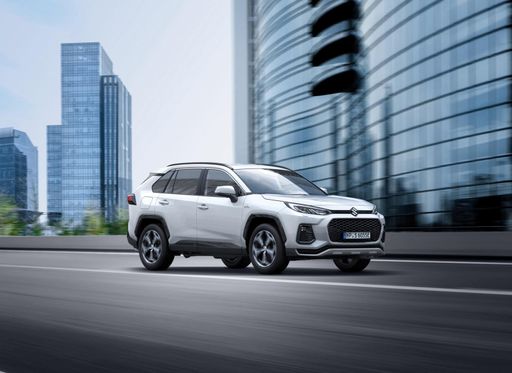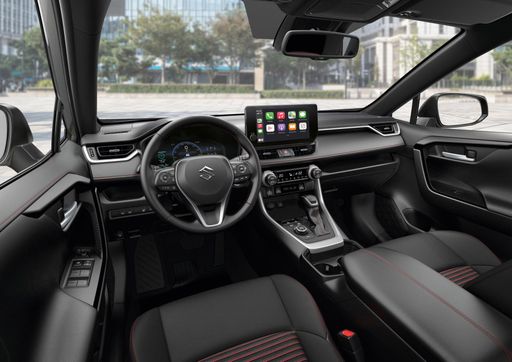Suzuki Across vs Toyota Prius - Differences and prices compared
Compare performance (306 HP vs 223 HP), boot space and price (49900 £ vs 39400 £ ) at a glance. Find out which car is the better choice for you – Suzuki Across or Toyota Prius?
Costs and Efficiency:
Price and efficiency are often the first things buyers look at. Here it becomes clear which model has the long-term edge – whether at the pump, the plug, or in purchase price.
Toyota Prius has a distinct advantage in terms of price – it starts at 39400 £ , while the Suzuki Across costs 49900 £ . That’s a price difference of around 10457 £.
Fuel consumption also shows a difference: Toyota Prius manages with 0.50 L and is therefore convincingly more efficient than the Suzuki Across with 1 L. The difference is about 0.50 L per 100 km.
As for electric range, the Toyota Prius performs somewhat better – achieving up to 86 km, about 11 km more than the Suzuki Across.
Engine and Performance:
Power, torque and acceleration say a lot about how a car feels on the road. This is where you see which model delivers more driving dynamics.
When it comes to engine power, the Suzuki Across has a clearly perceptible edge – offering 306 HP compared to 223 HP. That’s roughly 83 HP more horsepower.
In acceleration from 0 to 100 km/h, the Suzuki Across is to a small extent quicker – completing the sprint in 6 s, while the Toyota Prius takes 6.80 s. That’s about 0.80 s faster.
In terms of top speed, the Suzuki Across performs slight better – reaching 180 km/h, while the Toyota Prius tops out at 177 km/h. The difference is around 3 km/h.
Space and Everyday Use:
Whether family car or daily driver – which one offers more room, flexibility and comfort?
Both vehicles offer seating for 5 people.
In curb weight, Toyota Prius is noticeable lighter – 1620 kg compared to 2075 kg. The difference is around 455 kg.
In terms of boot space, the Suzuki Across offers significantly more room – 490 L compared to 284 L. That’s a difference of about 206 L.
When it comes to payload, Suzuki Across to a small extent takes the win – 435 kg compared to 375 kg. That’s a difference of about 60 kg.
Who comes out on top?
Overall, the Toyota Prius shows itself to be dominates this comparison and secures the title of DriveDuel Champion.
It convinces with the more balanced overall package and proves to be the more versatile choice for everyday use.

Toyota Prius
Costs and Consumption
View detailed analysis
Engine and Performance
View detailed analysis
Dimensions and Body
View detailed analysis
Suzuki Across
The Suzuki Across is Suzuki's take on a roomy, efficient plug-in SUV handed down from its Toyota cousin, marrying sensible practicality with a polished, grown-up driving character. It won't thrill those chasing sporty drama, but for buyers who value measured refinement, low running costs and lots of usable space, it's an unexpectedly accomplished and subtly premium package.
details

Toyota Prius
The Prius glides through traffic like a wise commuter's secret weapon, balancing miserly running costs with an unflappable sense of reliability. It's not a thrill seeker, but its roomy cabin, sensible packaging and low-stress driving personality make it a brilliant choice for buyers who value peace of mind over pulse-raising performance.
details



Costs and Consumption |
|
|---|---|
|
Price
49900 £
|
Price
39400 - 45800 £
|
|
Consumption L/100km
1 L
|
Consumption L/100km
0.5 - 0.7 L
|
|
Consumption kWh/100km
-
|
Consumption kWh/100km
-
|
|
Electric Range
75 km
|
Electric Range
72 - 86 km
|
|
Battery Capacity
-
|
Battery Capacity
-
|
|
co2
22 g/km
|
co2
12 - 17 g/km
|
|
Fuel tank capacity
55 L
|
Fuel tank capacity
40 L
|
Dimensions and Body |
|
|---|---|
|
Body Type
SUV
|
Body Type
Hatchback
|
|
Seats
5
|
Seats
5
|
|
Doors
5
|
Doors
5
|
|
Curb weight
2075 kg
|
Curb weight
1620 - 1630 kg
|
|
Trunk capacity
490 L
|
Trunk capacity
284 L
|
|
Length
4635 mm
|
Length
4599 mm
|
|
Width
1855 mm
|
Width
1782 mm
|
|
Height
1690 mm
|
Height
1470 mm
|
|
Max trunk capacity
1604 L
|
Max trunk capacity
-
|
|
Payload
435 kg
|
Payload
365 - 375 kg
|
Engine and Performance |
|
|---|---|
|
Engine Type
Plugin Hybrid
|
Engine Type
Plugin Hybrid
|
|
Transmission
Automatic
|
Transmission
Automatic
|
|
Transmission Detail
CVT
|
Transmission Detail
CVT
|
|
Drive Type
All-Wheel Drive
|
Drive Type
Front-Wheel Drive
|
|
Power HP
306 HP
|
Power HP
223 HP
|
|
Acceleration 0-100km/h
6 s
|
Acceleration 0-100km/h
6.80 s
|
|
Max Speed
180 km/h
|
Max Speed
177 km/h
|
|
Torque
-
|
Torque
-
|
|
Number of Cylinders
4
|
Number of Cylinders
4
|
|
Power kW
225 kW
|
Power kW
164 kW
|
|
Engine capacity
2487 cm3
|
Engine capacity
1998 cm3
|
General |
|
|---|---|
|
Model Year
2024
|
Model Year
2023
|
|
CO2 Efficiency Class
B
|
CO2 Efficiency Class
B
|
|
Brand
Suzuki
|
Brand
Toyota
|
What drivetrain options does the Suzuki Across have?
The Suzuki Across is offered with All-Wheel Drive.




